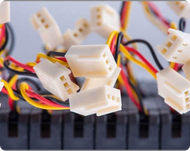Electronic QSLing
Posted by Steve Kennedy - VK6SJ
So, from last week we now know all about hard copy QSL
cards. There is something magical about hard copy cards and I hope they never
die out, but I am equally thankful for a new way of verifying contacts
electronically.
When you look at the costs of soliciting a card from a rarer
entity in the old fashioned way (posting a card to the station with sufficient
funds for return postage – normally anywhere between 2 & 5 US dollars), you
could easily spend $10 Australian dollars. LoTW and eQSL are free in their
basic forms so you can see the attraction of using electronic means to confirm
a QSO.
How do electronic QSL cards work? There are several systems
available, with varying levels of security. The two most common Electronic QSL services
used for official verification of a contact (i.e. can be used for DX awards in
place of hard copy QSL cards, as described in an earlier article on DXCC), are
E-QSL and “Log of the world”. E-QSL is a volunteer service that does have a modest
cost for all but the most basic service. This service provides an ability to
have an actual graphic representation of a card and you can even get them to
print cards out and send them, or you can download the graphic file and print
it yourself. The second service is called Log of The World or LoTW for short.
This is run by the ARRL (American version of the WIA) and is completely free worldwide.
It doesn’t have a graphic capability. It merely confirms contacts providing
both sides of the contact have submitted logs to the service, and via an
application on your PC, allows you to tag each verified contact in your logbook
as a confirmed contact. Both services require you to provide proof of having a
license and both have a means of authenticating your bonafides prior to use of
the service as a fully fledged member of the service.
WIA accepts both eQSL and LoTW. The ARRL only accepts LoTW
for DXCC purposes. Many hams (me included) do both eQSL and LoTW. Some only do
paper cards, some only eQSL and some only LoTW and some do nothing at all. It’s
a personal preference thing.
There are other means of electronically acknowledging a
contact that whilst aren’t valid for DX awards, are still very popular. These
include ClubLog, HRDLog and QRZ.com. QRZ.com is very popular as most hams use
QRZ.com as a blog style web page that has become the defacto online
international callbook and which also includes an online logbook. Most good
electronic logbooks will automatically send contact entries to 4 of the 5
common databases as you enter a contact into the logbook. LoTW doesn’t allow
automated uploads of single contacts from any of the logbooks.
- ClubLog stands out on its own a little as it has several
additional features that aren’t available on the other databases. Many hams (me
included) use ClubLog as a backup log so that if my logging PC crashes, I can
at least download basic information from Club log and rebuild my log on a new
PC or hard drive. ClubLog has a few additional features including;
- OQRS. This allows a user with a validated
contact to request a QSL card either direct or via the bureau from someone
without having to send out a card out first. I use this service because while I
like getting cards, I don’t want thousands of cards a year from the same
countries. If someone wants a card direct from me but doesn’t want to send me
one, they can pay for the postage online and I just send them a card. The OQRS
page can direct some who wants a card in that way to my PayPal account for them
to pay, and sends me an email asking me to send the card. As a side thing, if
someone goes to the trouble of just sending me their card, I’ll send them one
back the same way. Not so easy for a rare DX station though.
There is an online DX league that you can
configure however you like to compare how you are featuring against your peers,
based on annual or all-time scores of most countries worked, confirmed, across
single or multiple bands or modes etc.
You can check for your callsign in a DX
station’s log so you aren’t wasting on postage and green stamps for a contact
the other station does not acknowledge. Because Clublog contact confirmations
can not be used for DXCC awards, most rare DX stations or DXpeditions upload to
ClubLog either regularly or in real time, whereas they generally wont upload to
eQSL or LoTW for up to 6 months from a DXpedition.
QRZ.com is popular because it is already enjoys’ widespread
support as a global online callbook. It is extremely rare to work a station
outside of Australia who doesn’t have a page on QRZ.com. Many hams just use the
logbook on their QRZ.com page as their own logbook, and the QRZ.com logbook
also integrates with Log of the world.
So…. You have a huge choice of electronic logbooks around
these days, HRD Logbook, LogforOM, Swiss log, N1MM and the list goes on. Most
of them will send contact details to the various online logs, so which logs
should you send to? I’m not sure there is a “best“ one and everyone will have
an opinion on what that best one is. Given the software in a logging program
can do all of them, I find it easier to send entries to all of them than deal
with emails every day asking me to submit my log on QRZ.com etc.
Setting your logbook up to do this is a one time piece of effort, but once it is done, you don’t need to focus on it again.

